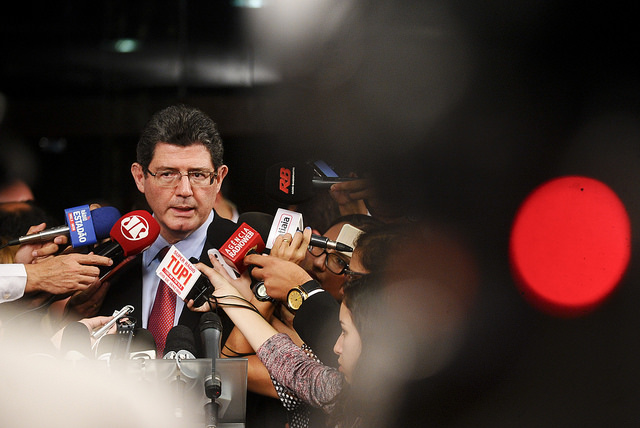
Finance Minister Joaquim Levy says that unemployment is going to increase in Brazil and that Brazilians should “face some realities.” No country should have a finance minister with this attitude towards one of its population’s most important needs – employment. And even worse, someone who is acting on these twisted beliefs in order to make them reality. His own job should be the first to go.
The vast majority of Brazilians are still hugely better off than they were before the Workers Party assumed the presidency in January of 2003. Poverty was reduced by 55 percent and extreme poverty by 65 percent from 2003-2012 and real (inflation-adjusted) wages grew by 35 percent – including a doubling of the real minimum wage. From 2004-2010, the economy grew twice as fast as it had over the previous 23 years, and the gains from growth were much more equally distributed.
But these gains are being eroded, as the economy sinks into recession and unemployment rises. Why has this happened? A new report by Brazilian economists Franklin Serrano and Ricardo Summa shows that it is not primarily due to external factors – for example, the slowdown of global economic growth and trade. Rather it is mainly a result of government policies that have reduced aggregate demand since the end of 2010: tighter budgets, cuts in public investment, higher interest rates, and tighter credit.
Austerity is not working in Brazil – any more than it has been working in Europe. These policies are not only creating unnecessary unemployment and poverty in the present, they are also sacrificing Brazil’s future. Brazil needs public investment in transportation and other infrastructure, but this is the spending that is first to be sacrificed.
The Central Bank has raised short-term interest rates from 7.5 percent in April 2013 to 14.25 percent today. As a result of having exorbitant interest rates for many years, the government pays more than 6 percent of GDP – about 20 percent of federal spending – in net interest. This is among the world’s highest government interest burdens.
Lowering interest rates could free up money in the budget for public investment. It is clear that the government needs to increase spending in order to jump-start the economy. This is what it did, successfully, when the global financial crisis and recession hit in 2009.
Brazil does not yet have to worry about external financial constraints, as it currently has $369 billion in reserves. Its net public debt is only about 34 percent of GDP (This is low by any comparison; the problem is the exorbitant interest rates, averaging 11 percent on outstanding government bonds). The economy has plenty of reason to grow, but it is clear that the private sector is not going to lead this growth.
Dilma won re-election in 2014 by promising to stand up to the oligarchy, and continue the successful policies that brought considerable economic and social progress to Brazil for the first time in decades. Levy and his friends in Brazil’s powerful financial sector may prefer higher unemployment and lower wages, but that is not what Brazilians voted for. There is no reason for the government to commit political suicide by continuing to implement the failed economic program of its opposition.
Join us in defending the truth before it’s too late
The future of independent journalism is uncertain, and the consequences of losing it are too grave to ignore. To ensure Truthout remains safe, strong, and free, we need to raise $43,000 in the next 6 days. Every dollar raised goes directly toward the costs of producing news you can trust.
Please give what you can — because by supporting us with a tax-deductible donation, you’re not just preserving a source of news, you’re helping to safeguard what’s left of our democracy.